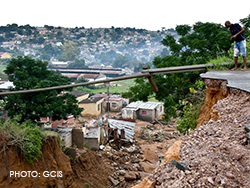
The Ad Hoc Joint Committee on Flood Disaster Relief and Recovery concluded its three-day visit to the Eastern Cape last Friday by visiting King Sabatha Dalindyebo Local Municipality, where it received a briefing on the damage caused in the floods in April this year and the municipality’s flood disaster relief and recovery plans.
Mayor Mr Nyaniso Nelani led a delegation of councillors and senior managers to brief the committee. He reminded the committee that floods occur in the same area often. There were flood-related disasters in 2011, 2012 and 2013, again in 2017 and 2018, and then again in 2020, 2021 and now 2022.
Mr Nelani mentioned that the municipality experienced three recent disasters within the space of five months, on 9 December 2021, 8 January 2022 and the most recent one on 23 April 2022, which affected 25 wards. The April disaster left 349 families homeless and partially destroyed 427 houses.
The assessment and verification of housing-related damages were completed in May 2022, Mr Nelani reported, and the Department of Human Settlements appointed the Housing Development Agency as the service provider to provide the shelters. He the infrastructure assessment has been completed and it has been estimated that the damage will cost R310 million to fix.
The floods also had a dire impact on roads and bridges, eroding 590 kilometres of gravel roads and damaging 14 bridges. Ndibela Road was the worst affected but regrading has begun using the municipal fleet. More resources will be required, however, and the municipality has reprioritised funding, on the advice of the National Treasury.
The committee heard that roads and bridges were prioritised within the Municipal Infrastructure Grant budget and R15 million has been allocated towards their repair. Mr Nelani told the committee that this arrangement will impact negatively on the municipality’s programme to construct new roads, meaning that communities will have to wait longer for them.
On mitigation measures to prevent further flood damage, Mr Nelani said the municipality intends to improve bridge design over major rivers, so they are less prone to being washed away. In addition, research will be undertaken to find an appropriate house design for disaster-prone areas. Furthermore, the prohibition of settlements within the 100-year flood line must be enforced, particularly along major rivers. The municipality also has a climate change strategy and intends to educate its residents about the impacts of climate change and its mitigation plans.
During the engagement, committee members sympathised wholeheartedly with those who lost their homes and emphasised the urgency of implementing the municipality’s flood disaster relief and recovery programme. They also encouraged the municipality to drawn up a clear budget, separate from the municipality’s normal development programme, to repair the flood damage. They also underlined the importance of the municipality having clear mitigation plans for future disasters, seeing as the area is so prone to flooding.
The Co-Chairpersons of the committee appealed to the municipality to strengthen its flood disaster relief and recovery programme, as residents’ hopes are riding on local government fixing the problem. While welcoming the mayor’s briefing, the Co-Chairpersons also emphasised that more still needs to be done to respond to the most recent floods.
Mava Lukani
13 June 2022

